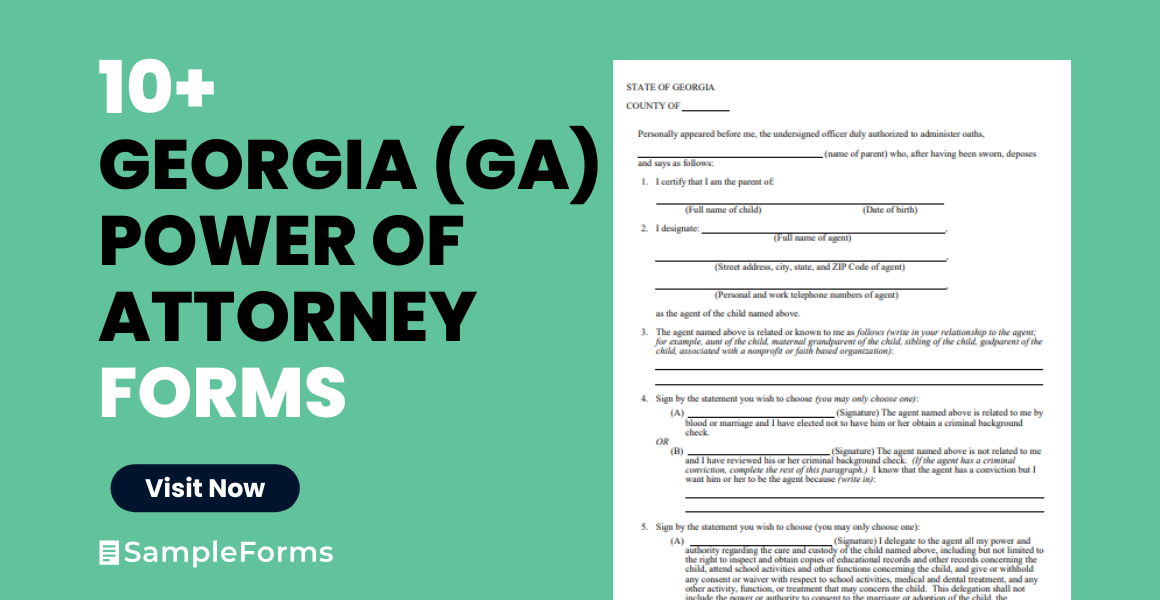Navigating the complexities of a Georgia Power of Attorney (POA) form can be daunting. Our guide simplifies this process, offering practical tips and clear instructions to ensure you use the POA form effectively. Whether for financial, healthcare, or legal matters, understanding the nuances of Georgia’s POA requirements is crucial. This introduction provides essential insights into creating, executing, and utilizing a POA form in Georgia, ensuring your decisions are legally sound and align with your intentions.
What is the Georgia Power of Attorney Form? – Definition
The Georgia Power of Attorney Form is a legal document that allows an individual, known as the principal, to designate another person, called the agent or attorney-in-fact, to make decisions and act on their behalf. This form can cover a range of activities, including financial, medical, or general decision-making. It’s used to grant authority to the agent, ensuring they can legally make choices for the principal under specified circumstances in Georgia.
What is the Best Sample Georgia Power of Attorney Form?
Below is a sample template for a Georgia Power of Attorney form. Please note that this is a basic template and should be customized to fit specific needs and legal requirements. It’s advisable to consult with a legal professional to ensure the form meets all necessary legal standards and accurately reflects your intentions.
Georgia Power of Attorney Form
Principal’s Information:
- Name: _______________________________________________________________________
- Address: _____________________________________________________________________
- Date of Birth: ________________________________________________________________
Agent’s Information:
- Name: _______________________________________________________________________
- Address: _____________________________________________________________________
- Relationship to Principal: ______________________________________________________
Powers Granted:
This Power of Attorney grants the following powers to the Agent:
- Financial Decisions: To manage and conduct all financial affairs and transactions.
- Real Estate: To buy, sell, rent, or manage real estate properties.
- Healthcare Decisions: To make healthcare decisions if the Principal is unable to do so.
- [Additional powers or limitations]
Duration:
This Power of Attorney shall become effective on _______________________________ [Effective Date] and shall remain in effect:
- Until _______________________________ [Expiration Date], or
- Until the Principal becomes incapacitated (if Durable), or
- Until revoked by the Principal.
Durable Power of Attorney:
☐ This Power of Attorney is Durable and shall not be affected by the Principal’s incapacity. ☐ This Power of Attorney is not Durable.
Signatures:
- Principal’s Signature: ___________________________________ Date: _______________
- Agent’s Signature: _____________________________________ Date: _______________
Acknowledgment by Notary Public:
State of Georgia, County of ____________________________________________________ This document was acknowledged before me on _______________ [Date] by __________________________ [Principal’s Name] and __________________________ [Agent’s Name].
Notary Public: ___________________________________________ My Commission Expires: __________________________________
Witnesses:
(As required by Georgia law, two witnesses are needed)
- Witness Name: _________________________________________ Signature: _______________
- Witness Name: _________________________________________ Signature: _______________
This form is a sample and should be tailored to fit specific circumstances. It is crucial to ensure that the form complies with current Georgia laws and regulations. Consulting with a legal expert is highly recommended for drafting a Power of Attorney form.
1. State of Georgia Power of Attorney Form
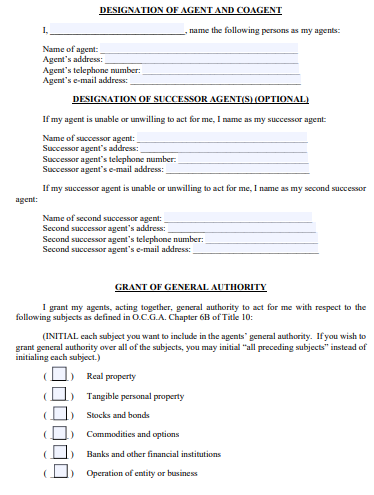
2. Georgia Special Power of Attorney Form
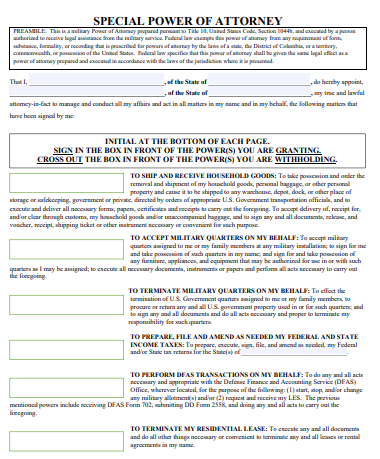
3. Georgia Sample Power of Attorney Form
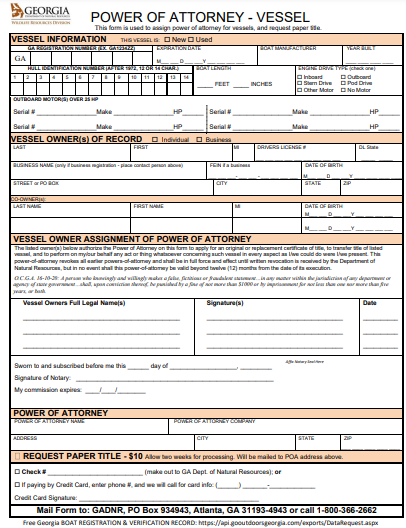
4. Georgia Power of Attorney Form
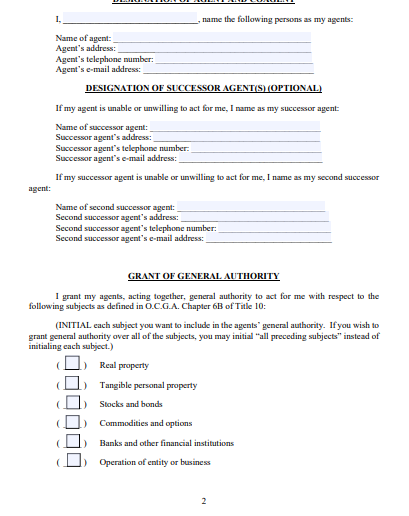
5. Georgia Power of Attorney Form for Minor Child
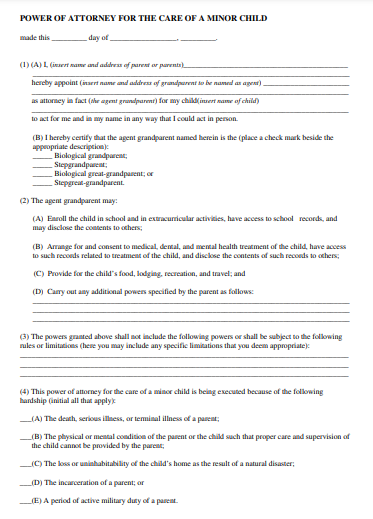
6. Georgia Motor Vehicle Power of Attorney Form
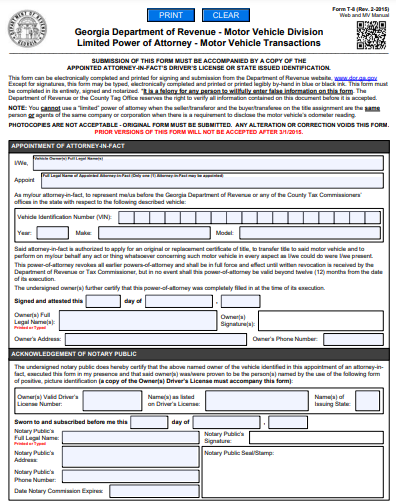
7. Georgia Limited Power of Attorney Form
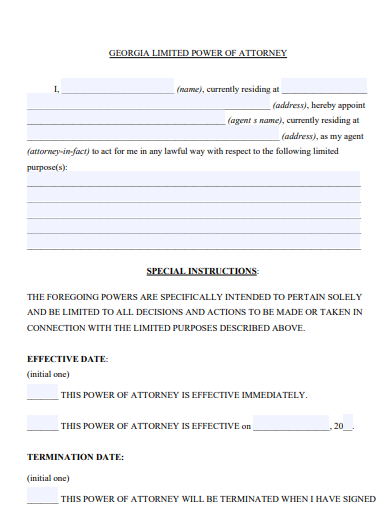
8. Georgia General Power of Attorney Form
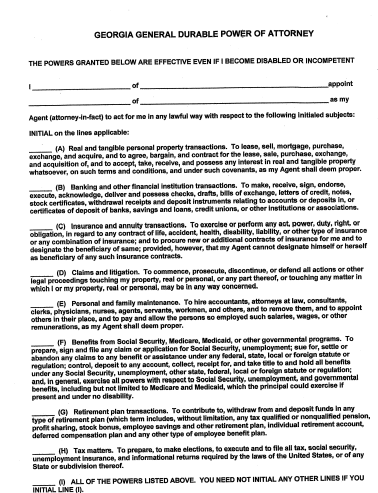
9. Georgia Financial Power of Attorney Form
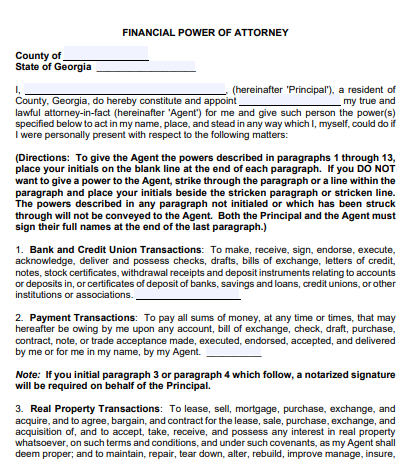
10. Georgia Durable Power of Attorney Form
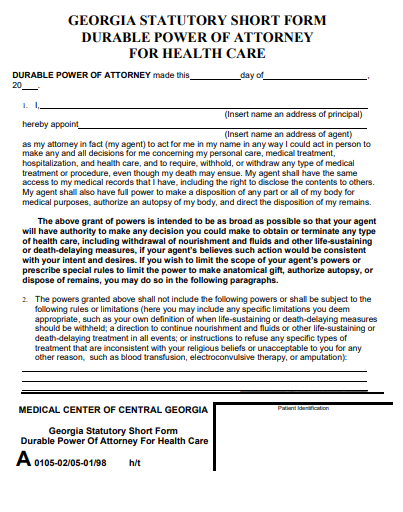
11. Georgia Blank Power of Attorney Form
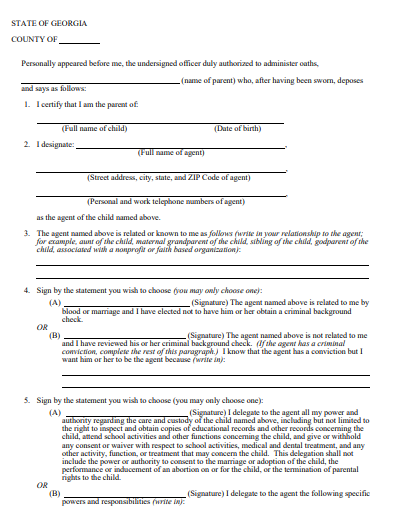
How do I get power of attorney in Georgia?
To obtain a Power of Attorney in Georgia, follow these steps:
- Choose the Right Type of POA: Determine whether you need a general, durable, healthcare, or limited Power of Attorney based on your requirements.
- Select a Trusted Agent: Choose someone you trust to act as your agent. This person will make decisions on your behalf.
- Draft the POA Document: Create the Power of Attorney document. You can use a template or seek legal assistance for a customized document.
- Include Necessary Details: The document should include your name, the agent’s name, the powers granted, and any limitations. If it’s a durable POA, explicitly state that it remains effective if you become incapacitated.
- Meet Legal Requirements: In Georgia, the POA must be signed by you and notarized. Some types of POA may also require witnesses.
- Sign in the Presence of a Notary: Sign the document in front of a notary public. This step is crucial for the document’s legal validity.
- Inform Relevant Parties: Give copies of the signed document to your agent and any institutions or individuals that may need it, like banks or healthcare providers.
- Store the Document Safely: Keep the original document in a secure place where your agent can access it if needed.
Remember, it’s advisable to consult with a legal professional to ensure that your Power of Attorney complies with Georgia laws and accurately reflects your wishes.
What is a statutory form power of attorney state of Georgia?
A Statutory Form Power of Attorney in Georgia refers to a standardized Power of Attorney (POA) form that complies with Georgia’s state laws. This form is created based on statutes provided in Georgia law, ensuring that it meets all legal requirements for a valid POA in the state. The statutory form typically covers a range of powers that can be granted to an agent, including financial decisions, property management, and other personal matters. By using a statutory form, individuals can be more confident that their POA is legally sound and will be recognized by financial institutions, healthcare providers, and courts within Georgia.
Does a power of attorney need to be filed in Georgia?
In Georgia, a Power of Attorney (POA) does not generally need to be filed with any government office for it to be effective. It is a private agreement between the principal and the agent. However, if the POA is used for real estate transactions, it must be filed with the county recorder’s office where the property is located. This ensures the POA is a matter of public record, which is necessary for legal transactions involving real estate. For other purposes, like healthcare or general financial matters, filing is not required. It’s essential to keep the original document in a safe place and provide copies to relevant parties, such as financial institutions or healthcare providers, as needed.
How long does a power of attorney last in Georgia?
In Georgia, the duration of a Power of Attorney (POA) depends on the type of POA and any terms specified within the document.
- Durable Power of Attorney: This remains effective until the principal’s death unless revoked earlier. It continues to be valid even if the principal becomes incapacitated.
- Non-Durable Power of Attorney: This type of POA is only effective as long as the principal is mentally competent. It becomes invalid if the principal becomes incapacitated.
- Specific End Date: If the POA document specifies an end date, it will expire on that date unless revoked sooner.
- Revocation: The principal can revoke the POA at any time as long as they are mentally competent to do so.
- Death of the Principal: All POAs automatically terminate upon the death of the principal.
It’s important to clearly state the intended duration or conditions for termination in the POA document to avoid any confusion or legal issues.
How many witnesses are required for Georgia power of attorney?
In Georgia, a Power of Attorney (POA) must be signed in the presence of two witnesses to be legally valid. These witnesses must be competent adults, and it’s important that they are not the same individuals named as the agent in the POA. This requirement ensures that there is an unbiased confirmation of the principal’s intent and mental capacity at the time of signing the document. Additionally, the POA must also be notarized, which involves a separate acknowledgment by a notary public. These steps are crucial for the legal enforceability of the POA in Georgia.
Can a power of attorney be signed electronically Georgia?
Yes, in Georgia, a Power of Attorney (POA) can be signed electronically. Georgia law recognizes electronic signatures as valid and legally binding, as long as they adhere to the requirements set forth in the Uniform Electronic Transactions Act (UETA). This means that if all parties agree to use electronic signatures and the electronic signing process complies with the law, the electronically signed POA is considered just as valid as one signed with a traditional pen and ink. However, it’s important to ensure that the electronic signing process securely verifies the identity of the signatories and maintains the integrity of the document. Despite this allowance for electronic signatures, the POA still needs to be witnessed and notarized, which may require additional steps when done electronically.
How to Prepare a Georgia Power of Attorney Form
Step 1: Understand the Purpose of a Power of Attorney
- Know Your Needs: Determine why you need a Power of Attorney (POA). It could be for financial matters, healthcare decisions, or other specific purposes.
Step 2: Choose the Type of POA
- Durable vs. Non-Durable: Decide if you need a Durable POA (remains effective if you become incapacitated) or a Non-Durable POA (ends if you become incapacitated).
- Special or Limited POA: Consider a Special POA for specific tasks or a limited duration.
Step 3: Select Your Agent
- Choose Wisely: Pick someone you trust to act as your agent. This person should be reliable, capable, and willing to act in your best interests.
Step 4: Draft the POA Document
- Use a Template or Attorney: You can start with a standard template or consult an attorney for a customized POA.
- Include Essential Information: Clearly state your name, the agent’s name, the powers granted, and any limitations or conditions.
Step 5: Meet Legal Requirements
- Witnesses: Ensure the POA is signed in the presence of two competent adult witnesses.
- Notarization: Have the document notarized by a notary public to add legal validity.
Step 6: Sign the Document
- In Presence of Witnesses and Notary: Sign the POA form in front of the witnesses and notary. Ensure the agent also signs if required.
Step 7: Distribute Copies
- Inform Relevant Parties: Give copies of the signed POA to your agent and any institutions or individuals that may need it, like banks or healthcare providers.
Step 8: Store Safely
- Secure Storage: Keep the original POA in a safe place. Inform your agent where the document is stored.
Step 9: Regular Review and Revocation if Necessary
- Keep it Updated: Regularly review the POA and make updates as needed. You can revoke the POA at any time as long as you are mentally competent.
Following these steps ensures that your Georgia Power of Attorney form is prepared correctly, reflecting your wishes and complying with state legal requirements.
Tips for Using Effective Georgia Power of Attorney Form
1. Clearly Define the Powers Granted
- Be Specific: Detail the exact powers you are giving to your agent. This prevents misunderstandings and misuse of authority.
2. Choose the Right Agent
- Trust and Capability: Select someone you trust who is also capable of handling the responsibilities effectively.
3. Understand Different Types of POAs
- Durable vs. Non-Durable: Know the difference and choose the type that best suits your needs.
4. Comply with Georgia Legal Requirements
- Witnesses and Notarization: Ensure your POA is properly witnessed and notarized as per Georgia law.
5. Communicate with Your Agent
- Clear Instructions: Discuss your expectations and instructions with your agent thoroughly.
6. Keep the Document Accessible
- Safe but Accessible: Store the POA document where it can be easily accessed when needed.
7. Regularly Review and Update
- Stay Current: Regularly review and update your POA to reflect any changes in your situation or wishes.
8. Consider a Springing POA
- Control Activation: A springing POA activates only under specific circumstances, like incapacitation, offering more control.
9. Seek Professional Advice
- Legal Guidance: Consult with an attorney to ensure your POA is valid and meets all your needs.
10. Inform Relevant Parties
- Notify Institutions: Inform banks, healthcare providers, and others who may need to recognize the POA.
By following these tips, you can ensure that your Georgia Power of Attorney form is used effectively, safeguarding your interests and ensuring your affairs are managed as per your wishes.
What are the Rules for Power of Attorney in Georgia?
In Georgia, a Power of Attorney must be in writing, signed by the principal, witnessed by two adults, and notarized to be legally valid.
How Many Witnesses are Required for a Power of Attorney in Georgia?
Two competent adult witnesses are required for a Power of Attorney in Georgia, in addition to notarization.
How Long Does a Power of Attorney Last in Georgia?
A Power of Attorney in Georgia lasts until the principal’s death, revocation, or, if durable, until the principal becomes incapacitated.
Who Can Override a Power of Attorney in Georgia?
In Georgia, only the principal can revoke or override their Power of Attorney, as long as they are mentally competent.
Can You Have More Than One Power of Attorney in Georgia?
Yes, in Georgia, you can have multiple Power of Attorneys, each appointing different agents for different purposes or powers.
Effectively preparing and utilizing a Georgia Power of Attorney form requires understanding its legalities, choosing a reliable agent, and adhering to state-specific rules. By following the provided guidelines and tips, you can ensure your POA is legally sound, tailored to your needs, and a robust tool for managing your affairs with confidence and clarity in Georgia.
Related Posts
-
10+ Free New Hampshire (NH) Power of Attorney Form Download – How to Create Guide, Tips
-
10+ Free Nevada (NV) Power of Attorney Form Download – How to Create Guide, Tips
-
10+ Free Nebraska (NE) Power of Attorney Form Download – How to Create Guide, Tips
-
10+ Free Montana (MT) Power of Attorney Form Download – How to Create Guide, Tips
-
10+ Free Missouri (MO) Power of Attorney Form Download – How to Create Guide, Tips
-
10+ Free Minnesota (MN) Power of Attorney Form Download – How to Create Guide, Tips
-
10+ Free Mississippi (MS) Power of Attorney Form Download – How to Create Guide, Tips
-
10+ Free Massachusetts (MA) Power of Attorney Form Download – How to Create Guide, Tips
-
10+ Free Maryland (MD) Power of Attorney Form Download – How to Create Guide, Tips
-
10+ Free Maine (ME) Power of Attorney Form Download – How to Create Guide, Tips
-
10+ Free Louisiana (LA) Power of Attorney Form Download – How to Create Guide, Tips
-
10+ Free Kentucky (KY) Power of Attorney Form Download – How to Create Guide, Tips
-
10+ Free Kansas (KS) Power of Attorney Form Download – How to Create Guide, Tips
-
10+ Free Iowa (IA) Power of Attorney Form Download – How to Create Guide, Tips
-
10+ Free Indiana (IN) Power of Attorney Form Download – How to Create Guide, Tips
